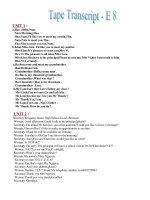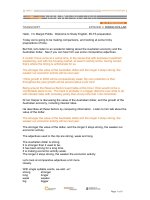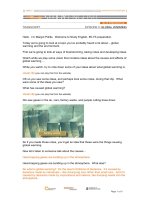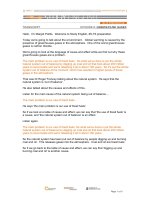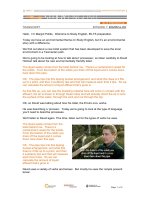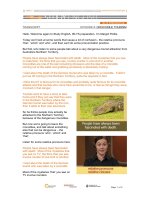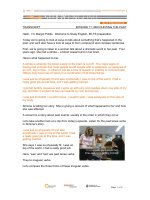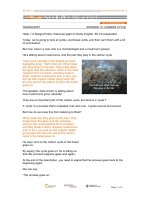- Trang chủ >>
- Đề thi >>
- THPT Quốc Gia
s2002 transcript
Bạn đang xem bản rút gọn của tài liệu. Xem và tải ngay bản đầy đủ của tài liệu tại đây (261.9 KB, 5 trang )
TRANSCRIPT
EPISODE 2: GINSENG
Hello. I’m Margot Politis. Welcome to Study English, IELTS preparation.
Today we’re going to look at using the word ‘say’ in four different ways – to give
examples, to narrow down, to quote and as a filler.
Our story looks at the anti-cancer qualities of the ginseng plant. Listen for the word
‘say’.
What they’ve found, say, in the case
of ginseng, is that it is something
that is difficult and slow growing, in
the wild and even in field cultivation.
So you can imagine ginseng, to have
a mature plant, it might be there for a
period of say 4 to 7 years.
While it’s in the ground, it can suffer
from pests, pest problems. I’ve
heard of instances where growers
have had the crop in the ground for
say 5 to 6 years. They’ve been keen
to keep it that extra year or two, to say form the right shape of the ginseng plant, and
then they’ve been struck by pests, virtually overnight.
The speaker, Dr David Armstrong, uses the word ‘say’ in several different ways.
Listen to the first one again.
What they’ve found, say, in the case of ginseng, is that it is something that is difficult
and slow growing.
The word ‘say’ in this clip is used to introduce an example.
In formal English, instead of using ‘say’, we would use ‘for instance’ or ‘for example’.
Have a look at these sentences:
“They have found, say, in the case
of ginseng, that it is difficult
to grow.”
“They have found, for instance, in
the case of ginseng, that it is difficult
to grow.”
“They have found, for example, in
the case of ginseng, that it is difficult
to grow.”
Page 1 of 5
So ‘say’ can be used to introduce an example.
Let’s listen to another use of the word ‘say’.
So you can imagine ginseng, to have a mature plant, it might be there for a period of
say 4 to 7 years.
‘Say’ in this clip has another meaning.
It’s used for narrowing down a time period. It means ‘around’ or ‘approximately’.
Listen for another example.
I’ve heard of instances where growers have had the crop in the ground for say 5 to 6
years.
The crop has been in the ground for say 5 to 6 years.
So the word ‘say’ here narrows
down a time period.
“The growers have had the crop in
the ground for ‘say’, 5 to 6 years.”
“The growers have had the crop in
the ground for ‘around’, 5 to 6
years.”
Dr Armstrong uses the word 'say' in
one more way. Listen here.
They’ve been keen to keep it that extra year or two to, say, form the right shape of
the ginseng plant and then they’ve been struck by pests.
He says “to, say, form the right shape of the ginseng plant”.
'Say' here is giving the speaker time to gather his thoughts. It’s used as a filler. He
could have said ‘um’, or one of the other language fillers.
For example: “to say, form the right shape of the ginseng plant.”
“to, um, form the right shape of the ginseng plant.”
There is one more use for the word ‘say’ – to quote. When we report what someone
else has said we call it indirect speech or reported speech.
Speakers often introduce indirect or reported speech using the verb ‘to say’.
Listen how the reporter talks about Dr McManus’s new approach to cancer treatment.
Page 2 of 5
Dr McManus says it’s a whole new approach to cancer treatment, using the slower
acting, milder, traditional herbal compounds as well as Western cancer drugs to try to
make conventional treatment more effective.
The reporter is quoting Dr McManus. She is talking about something that he has
said.
“Dr McManus ‘says’ it’s a whole new approach.”
So we’ve looked at 4 different uses of the word ‘say’ in that one short story.
This one word, ‘say’ turns out to be very useful in English!
The story we’ve watched about ginseng provides us with lots of vocabulary relating to
the topic of health and well being.
Now let’s listen to Dr McManus talking about the benefits of ginseng.
Listen for the vocabulary that relates specifically to this topic.
Dr McManus says it’s a whole new
approach to cancer treatment, using the
slower acting, milder, traditional herbal
compounds as well as Western cancer
drugs to try to make conventional
treatment more effective.
Mild doses every day is believed to
keep the body in equilibrium and just to
maintain general health and vitality and
stamina, and the other perhaps more
valuable application is when someone’s
dying. It’s believed to have life-enhancing properties, so because of that it
commands very high prices. I saw in, in Beijing, in a herbal pharmacy there, one
plant, a 50-year-old ginseng plant, worth $100,000. It’s because of the active
components increase with age over time, so a one-year-old root is nowhere near as
valuable as a six-year-old root and, of course a wild 50-year-old root is incredibly
valuable.
He uses a lot of health related words.
He says:
‘doses’,
‘body’,
‘equilibrium’,
‘health’,
‘vitality’,
and ‘stamina’.
Page 3 of 5
Did you notice how these words were combined together?
Let’s listen again.
Mild doses every day is believed to keep the body in equilibrium and just to maintain
general health and vitality and stamina.
Dr McManus says “Mild doses every day is believed to keep the body in equilibrium”.
The phrase ‘mild doses’ is a collocation.
In English, some word combinations commonly go together. These combinations are
called collocations.
There is no particular reason for these words to go together. They just sound right to
a native speaker, because of habit, history or usage.
Collocations occur in both noun phrases like ‘mild doses’, and verb phrases such as
to ‘keep the body in equilibrium’.
Let’s look at some common noun phrase collocations.
We say ‘high prices’.
‘High’ collocates with ‘prices’. We don’t say ‘large prices’ or ‘big prices’, we say ‘high
prices’.
We say a ‘tall building’, not a ‘high
building’.
Collocations are not just about the
words that go together, but also the
order they go in.
We always say ‘black and white’, not
white and black.
We say ‘salt and pepper’, and 'hot
and cold'.
Another important collocation is the way we say ‘directions’. English speakers
always say ‘north, south, east and west’, in that order.
The topic of today’s story is a collocation as well – ‘health and well-being’. These
nouns are often used together, in this order.
Page 4 of 5
Listen to Dr McManus again. You’ll hear him use a number of other collocations,
such as ‘general health’, ‘valuable application’, life-enhancing properties’ and ‘high
prices’.
Mild doses every day is believed to keep
the body in equilibrium and just to
maintain general health and vitality and
stamina, and the other perhaps more
valuable application is when someone’s
dying. It’s believed to have life-enhancing
properties, so because of that it
commands very high prices.
Choosing the right word combination will
make your speech and writing sound
more natural. Also, choosing the best
collocation will enable you to express
yourself more clearly and precisely.
So today we’ve looked at the word ‘say’ for giving an example, narrowing down,
quoting, and as a filler. We also looked at some collocations relating to health words.
Don’t forget that you can go to our website for the transcript, study notes and
exercises for today’s story.
And I’ll see you next time for Study English. Bye bye.
Page 5 of 5
